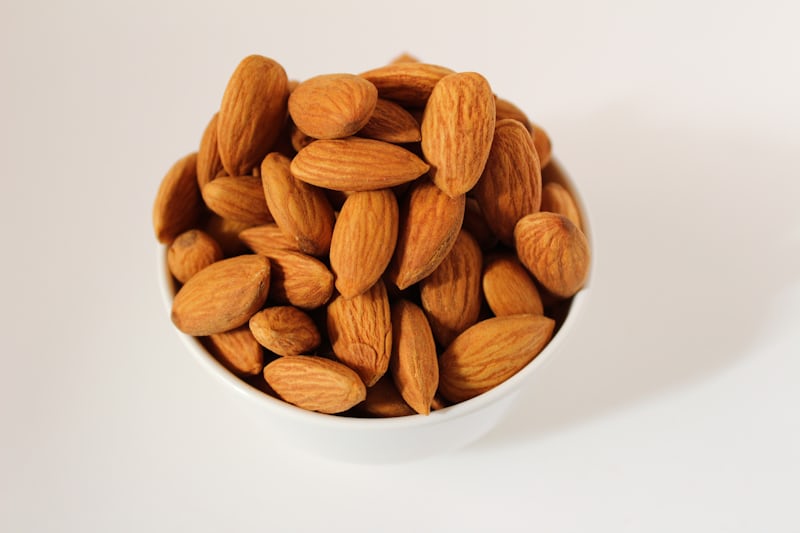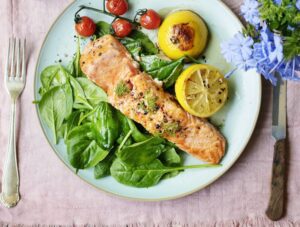5-Day Diabetes-Friendly Anti-Inflammatory Meal Plan for Beginners

Managing diabetes and inflammation can feel overwhelming for beginners, but a well-structured meal plan can make a huge difference. This 5-day diabetes-friendly anti-inflammatory meal plan is designed to help you control blood sugar, reduce inflammation, and enjoy tasty, easy-to-prepare meals. By following these simple meal ideas, you’ll learn which foods promote health, which combinations work best, and how to maintain consistency without stress. Whether you’re new to healthy eating or looking for structured guidance, this plan offers a balanced approach with practical tips and beginner-friendly recipes.
Why an Anti-Inflammatory Diet Matters for Diabetes
Inflammation plays a significant role in blood sugar imbalances and insulin resistance. By choosing anti-inflammatory foods, you can:
- Reduce chronic inflammation linked to diabetes complications.
- Support heart health and overall metabolism.
- Maintain stable blood sugar levels throughout the day.
- Boost energy and improve digestion.
Key anti-inflammatory foods include leafy greens, berries, fatty fish, nuts, seeds, and healthy oils like olive oil. Avoiding ultra-processed foods, refined sugar, and excessive carbohydrates is crucial for better results.
How This 5-Day Meal Plan Works
This 5-day diabetes-friendly anti-inflammatory meal plan is designed to stabilize blood sugar, reduce inflammation, and improve overall energy for beginners. Here’s how it works and why it’s effective:
- Structured Timing: Meals are divided into breakfast, mid-morning snack, lunch, afternoon snack, and dinner to prevent blood sugar spikes and crashes.
- Balanced Macronutrients: Each meal includes lean protein, healthy fats, and low-glycemic carbohydrates to maintain steady glucose levels.
- Anti-Inflammatory Foods: Foods like leafy greens, berries, fatty fish, nuts, seeds, and olive oil help reduce inflammation, which is often high in diabetes.
- Portion Control: Meal portions are moderate to prevent overeating and support weight management.
- Beginner-Friendly: Simple recipes and easy-to-prepare ingredients ensure anyone can follow this plan without feeling overwhelmed.
- Consistency & Adaptability: Following these meals consistently for 5 days helps your body adjust to a balanced routine, which can be extended beyond 5 days for long-term benefits.
- Expected Benefits: Within 5–7 days, you may notice improved energy, reduced bloating, better digestion, and more stable blood sugar levels. Long-term adherence supports inflammation reduction and overall health.
Day 1: Kickstart Your Anti-Inflammatory Journey
Breakfast
- Meal: Oatmeal cooked with ½ cup unsweetened almond milk, topped with ¼ cup blueberries, 1 tsp chia seeds, and a pinch of cinnamon.
- Preparation: Cook oats in almond milk, add toppings.
- Timing: Eat within 1 hour of waking up for stable energy.
- Benefits: Oats provide soluble fiber to slow sugar absorption; chia seeds add omega-3 for inflammation reduction; blueberries are antioxidant-rich for blood sugar control.
- Quantity Tip: Keep portion moderate; ½ cup oats is sufficient for breakfast.
Mid-Morning Snack
- Meal: 10–12 raw almonds + 1 cup green tea.
- Benefits: Almonds provide healthy fats and magnesium for blood sugar regulation; green tea supports metabolism and reduces inflammation.
- Timing: 2–3 hours after breakfast to maintain energy.
Lunch
- Meal: 100g grilled salmon, 1 cup steamed broccoli, ½ cup cooked quinoa.
- Preparation: Grill salmon with a teaspoon olive oil; steam broccoli; cook quinoa as per package.
- Benefits: Salmon is rich in omega-3 fatty acids (anti-inflammatory), broccoli provides fiber and vitamins, quinoa adds plant-based protein and stabilizes glucose.
- Quantity Tip: Salmon 100g is sufficient for protein; broccoli 1 cup adds fiber; quinoa ½ cup controls carb intake.
Afternoon Snack
- Meal: Carrot sticks (1 cup) with 2 tbsp hummus.
- Benefits: Provides fiber, antioxidants, and protein; keeps blood sugar stable and reduces hunger until dinner.
- Timing: Mid-afternoon, around 3–4 hours after lunch.
Dinner
- Meal: 100g stir-fried tofu with 1 cup mixed vegetables (bell peppers, zucchini, spinach), ½ cup brown rice.
- Preparation: Stir-fry tofu with veggies using 1 tsp olive oil.
- Benefits: Tofu adds plant protein; veggies provide fiber and antioxidants; brown rice is low-glycemic, preventing sugar spikes.
- Timing: Eat at least 2–3 hours before bed for proper digestion.
Day 2: Stabilize Blood Sugar Naturally
Breakfast
- Meal: ½ cup Greek yogurt + 1 tsp flax seeds + ¼ cup raspberries + 5 chopped walnuts.
- Benefits: Yogurt provides protein and probiotics; flax seeds and walnuts add omega-3 fatty acids; raspberries add antioxidants and fiber to manage blood sugar.
- Quantity: Keep yogurt portion ½ cup, seeds 1 tsp, berries ¼ cup, walnuts 5 pieces.
Mid-Morning Snack
- Meal: 1 cup cucumber slices with 2 tbsp guacamole.
- Benefits: Healthy fats from avocado reduce inflammation; cucumbers provide hydration and fiber.
Lunch
- Meal: 100g grilled chicken breast + spinach, tomato, cucumber salad dressed with 1 tsp olive oil.
- Benefits: Lean protein stabilizes blood sugar; vegetables add fiber, vitamins, and antioxidants.
Afternoon Snack
- Meal: 10–12 pumpkin seeds + 1 cup herbal tea.
- Benefits: Magnesium-rich seeds help regulate glucose; tea provides antioxidants.
Dinner
- Meal: 100g baked cod + 1 cup roasted Brussels sprouts + ½ cup sweet potato wedges.
- Benefits: Cod provides lean protein; Brussels sprouts are high in fiber and antioxidants; sweet potato is a low-GI carb for energy.
Day 3: Boost Immunity and Reduce Inflammation
Breakfast
- Meal: Smoothie: 1 cup kale, ½ avocado, ½ green apple, 1 tsp chia seeds, ½ cup unsweetened almond milk.
- Benefits: Kale and apple provide fiber and antioxidants; avocado and chia seeds deliver healthy fats; supports blood sugar control.
Mid-Morning Snack
- Meal: Celery sticks (1 cup) with 1 tbsp almond butter.
- Benefits: Protein and fiber for satiety; anti-inflammatory fats from almond butter.
Lunch
- Meal: Quinoa (½ cup) + ½ cup chickpeas + roasted mixed vegetables + 1 tsp tahini dressing.
- Benefits: High protein, fiber-rich, anti-inflammatory dressing; stabilizes blood sugar and supports digestion.
Afternoon Snack
- Meal: 5–6 walnuts + 1 cup green tea.
- Benefits: Omega-3 fatty acids for inflammation; antioxidants from tea.
Dinner
- Meal: 100g grilled turkey breast + 1 cup steamed asparagus + cauliflower mash (½ cup).
- Benefits: Lean protein, fiber-rich vegetables, low-GI mash for blood sugar stability.
Day 4: Energy & Focus for Beginners
Breakfast
- Meal: 2 scrambled eggs + 1 cup spinach + ½ cup chopped tomatoes + 1 slice whole-grain toast.
- Benefits: Protein and fiber-rich meal; supports glucose control, satiety, and morning energy.
Mid-Morning Snack
- Meal: 1 tbsp sunflower & pumpkin seeds + water.
- Benefits: Healthy fats and minerals to support blood sugar and metabolism.
Lunch
- Meal: Lentil soup (1 cup) + mixed vegetables + small side salad.
- Benefits: High protein & fiber; anti-inflammatory; keeps blood sugar stable.
Afternoon Snack
- Meal: 1 cup sliced bell peppers + 2 tbsp hummus.
- Benefits: Fiber, antioxidants, and plant-based protein.
Dinner
- Meal: 100g baked salmon + 1 cup roasted zucchini + ½ cup quinoa.
- Benefits: Omega-3 rich, anti-inflammatory, low-GI carbs stabilize glucose levels.
Day 5: Maintain Consistency & Lifestyle Balance
Breakfast
- Meal: Chia pudding: 2 tbsp chia seeds + ½ cup unsweetened almond milk + ¼ cup fresh strawberries + 1 tsp flax seeds.
- Benefits: Fiber, antioxidants, healthy fats; supports blood sugar control and digestive health.
Mid-Morning Snack
- Meal: 10 almonds or 5 walnuts.
- Benefits: Protein and healthy fats for sustained energy.
Lunch
- Meal: 100g grilled chicken + 1 cup sautéed spinach & bell peppers + ½ cup brown rice.
- Benefits: Balanced protein and fiber; helps maintain steady glucose levels and reduces inflammation.
Afternoon Snack
- Meal: 1 cup carrot sticks + 2 tbsp guacamole.
- Benefits: Healthy fats + fiber; controls hunger before dinner.
Dinner
- Meal: 100g baked cod + 1 cup roasted cauliflower + 1 cup steamed green beans.
- Benefits: Lean protein, fiber, and micronutrients; promotes anti-inflammatory benefits and stabilizes blood sugar overnight.
Top Anti-Inflammatory Foods for Diabetes
- Leafy greens: spinach, kale, swiss chard
- Fatty fish: salmon, mackerel, sardines
- Berries: blueberries, raspberries, strawberries
- Seeds: chia, flax, pumpkin
- Nuts: almonds, walnuts
- Healthy oils: extra virgin olive oil, avocado oil
- Legumes: lentils, chickpeas, black beans
- Herbs & spices: turmeric, ginger, cinnamon, garlic
FAQs
What is a diabetes-friendly anti-inflammatory meal plan?
It’s a structured eating plan designed to lower inflammation and manage blood sugar. It focuses on whole foods, lean proteins, healthy fats, and low-glycemic carbs.
Which foods help reduce inflammation in diabetes?
Leafy greens, berries, fatty fish, nuts, seeds, legumes, olive oil, and spices like turmeric and cinnamon are highly anti-inflammatory and blood-sugar friendly.
Can a 5-day meal plan help control blood sugar?
Yes, following a balanced 5-day plan can stabilize blood sugar, reduce inflammation, and guide long-term healthy eating habits.
How can beginners follow an anti-inflammatory diet?
Start with simple recipes, focus on whole foods, avoid processed sugar, meal prep in advance, and follow portion control for consistent results.
Conclusion:
This 5-day diabetes-friendly anti-inflammatory meal plan is perfect for beginners looking to stabilize blood sugar, reduce inflammation, and improve overall health. By following the suggested meals, incorporating key anti-inflammatory foods, and staying consistent, you can experience better energy, improved digestion, and a more balanced lifestyle. Always remember to listen to your body, adjust portions as needed, and combine healthy eating with regular physical activity for optimal results.
You Can Also Check:
- Healthline: Anti-Inflammatory Diet
- American Diabetes Association: Nutrition
- Mayo Clinic: Anti-Inflammatory Diet
Disclaimer
This article is for informational purposes only and is not a substitute for professional medical advice. Please consult a healthcare provider or registered dietitian before making any changes to your diet, especially if you have diabetes or other medical conditions.
About the Author
This article is written by the VitaGlowZenith Editorial Team. We provide easy-to-understand, evidence-based wellness tips to help you make better health and lifestyle choices.


